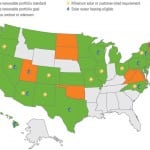Bipartisan legislation introduced on Wednesday by a bicameral group of lawmakers seeks to give renewable energy project investors access to an existing corporate structure whose tax benefits are now only available to investors in fossil fuel–based energy projects.
The Master Limited Partnerships Parity Act, reintroduced by Sens. Chris Coons (D-Del.), Jerry Moran (R-Kan.), Debbie Stabenow (D-Mich.), and Lisa Murkowski (R-Alaska) in the Senate on Wednesday essentially seeks to modify the federal tax code and make available private capital by helping renewable power companies form master limited partnerships (MLPs). The MLP Parity Act was also introduced in the House on Wednesday by Reps. Ted Poe (R-Texas), Mike Thompson (D-Calif.), Peter Welch (D-Vt.), and Chris Gibson (R-N.Y.).
An MLP is a business structure that is taxed as a partnership, but whose ownership interests are traded like corporate stock on a market. By statute, MLPs have only been available to investors in energy portfolios for oil, natural gas, coal extraction, and pipeline projects. These projects get access to capital at a lower cost and are more liquid than traditional financing approaches to energy projects, making them effective at attracting private investment. "Investors in renewable energy projects, however, have been explicitly prevented from forming MLPs, starving a growing portion of America’s domestic energy sector of the capital it needs to build and grow," the senators said in a joint statement.
"The bipartisan Master Limited Partnerships Parity Act levels the playing field to help clean and renewable energy projects compete fairly with traditional energy projects,” said Senator Coons, a member of the Senate Energy and Natural Resources Committee. “This market-driven solution supports the all-of-the-above energy strategy we need to power our country for generations to come. Our legislation will unleash private capital, create jobs and modernize our tax code. That’s why it has earned broad support from Republicans and Democrats in Congress, as well as academics, outside experts, business leaders and investors.”
The MLP Parity Act introduced on Wednesday is an expanded version of a bill introduced last year. It continues to include eligibility for renewable power generation and biofuels resources, but it further clarifies how expansion of the law would be implemented. Additionally, it widens the scope of projects that qualify for MLP status to include energy efficient buildings, waste-heat-to-power, carbon capture and storage, and biochemicals. The updated version of the bill also provides increased clarity and specificity on how it would be implemented if made law.
The bill will now progress through the Senate Finance Committee and the House Ways and Means Committee. The measure has a number of supporters from renewable energy industry groups, environmental groups, and power companies. It is also backed by the White House.
The bill also has advantages for fossil-fueled generation. “On behalf of participating industrial and other companies, labor unions, environmental organizations and state officials, the National Enhanced Oil Recovery Initiative applauds the MLP Act’s sponsors for expanding MLP eligibility to increase private investment in carbon capture and storage projects," said Judi Greenwald and Brad Crabtree, co-directors of the National Enhanced Oil Recovery Initiative. "Capturing carbon dioxide from power plants and many other industrial facilities for use in enhanced oil recovery produces more American oil, creates good-paying jobs, generates net new revenue for the federal treasury, and reduces CO2 emissions.”
Sources: POWERnews, Sen. Chris Coons








